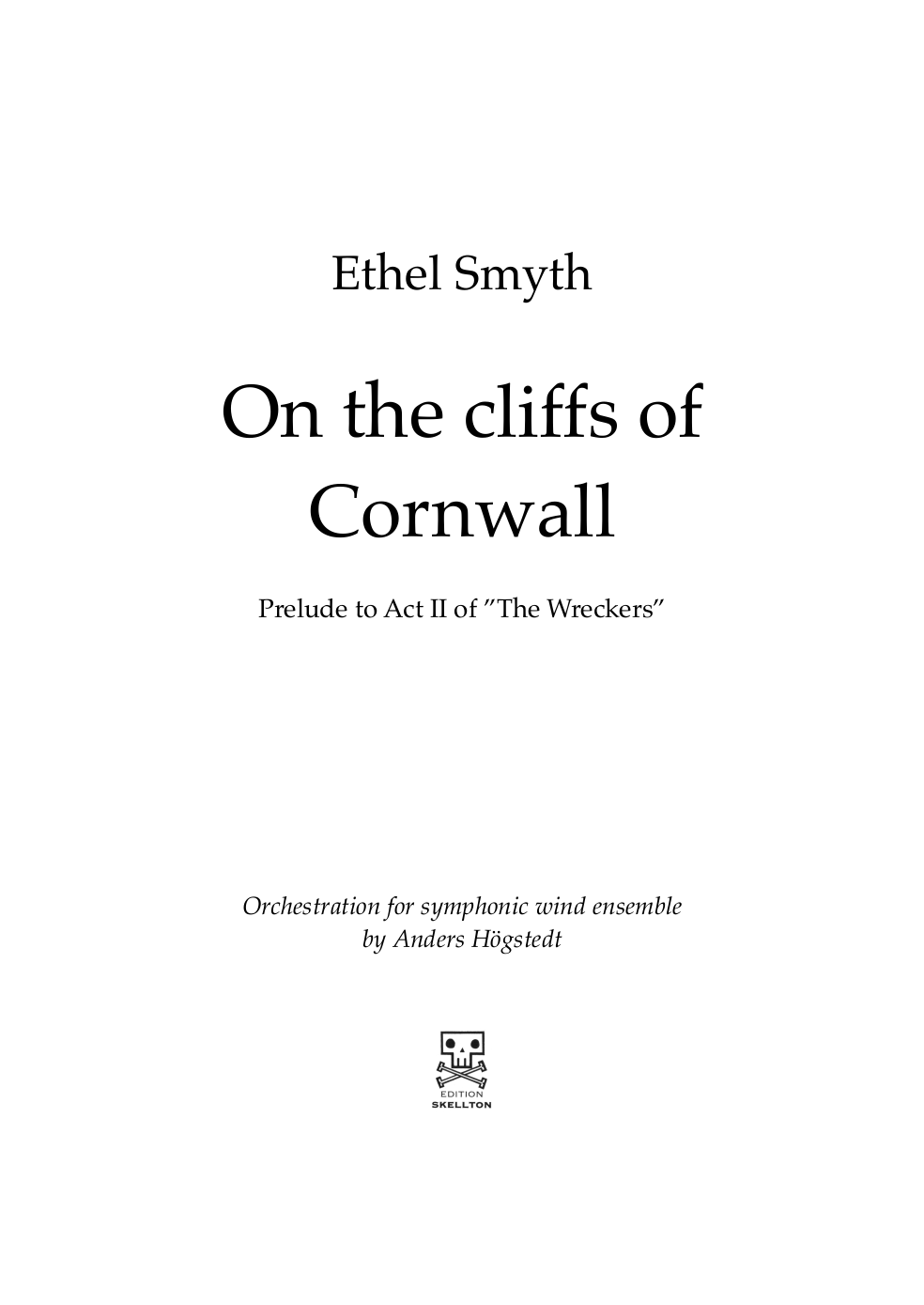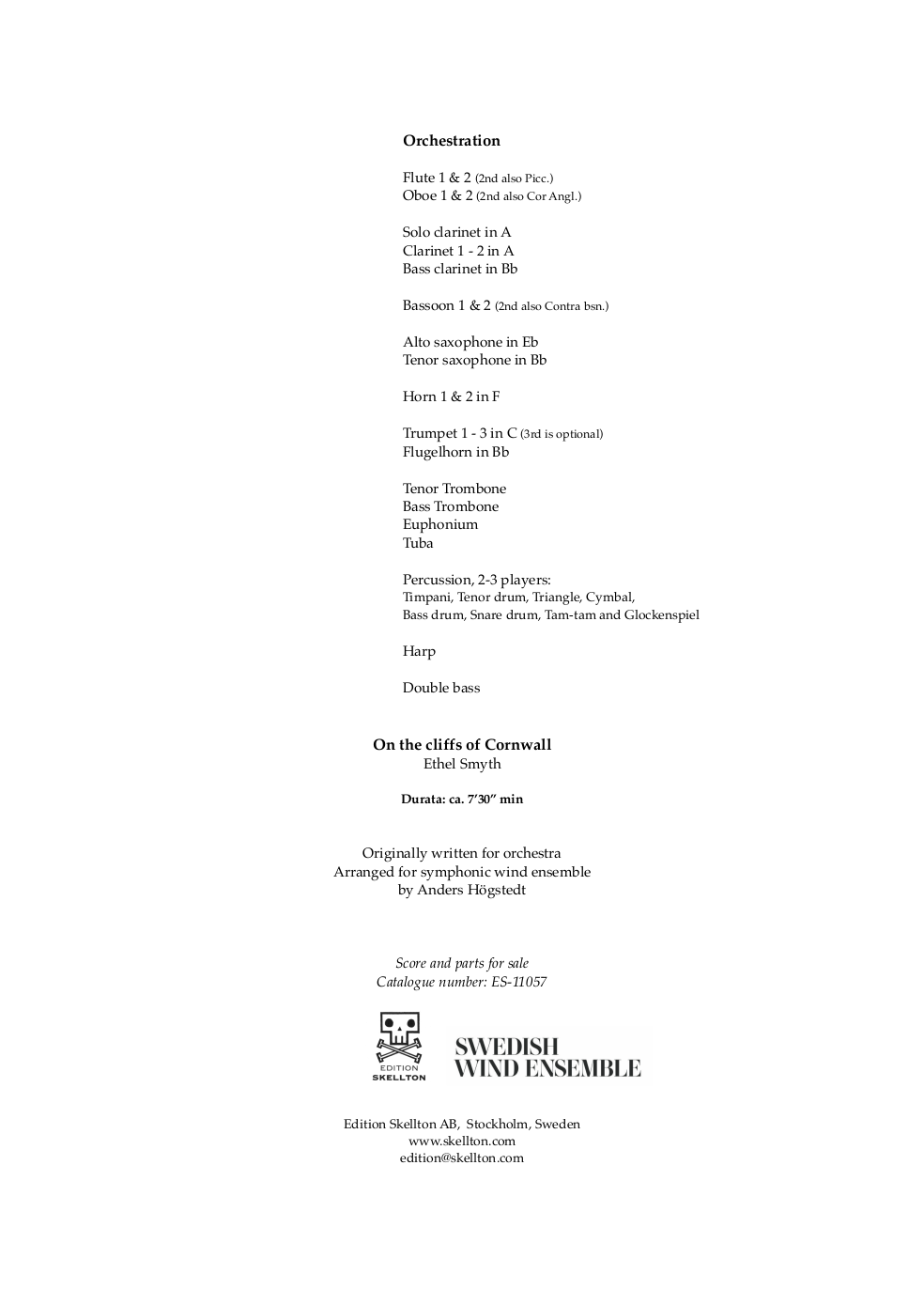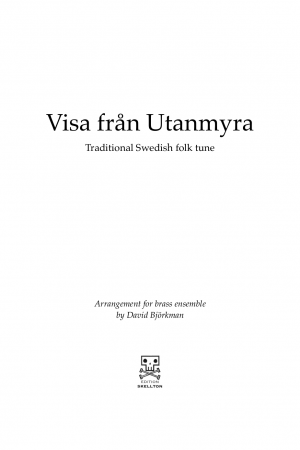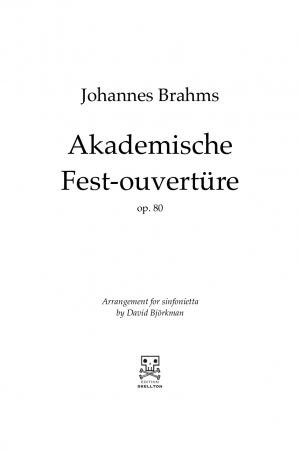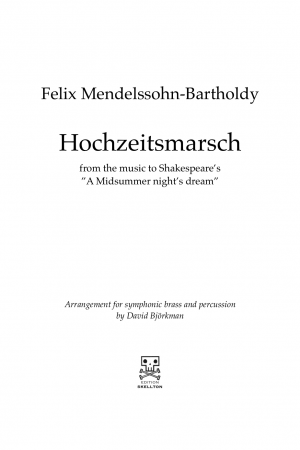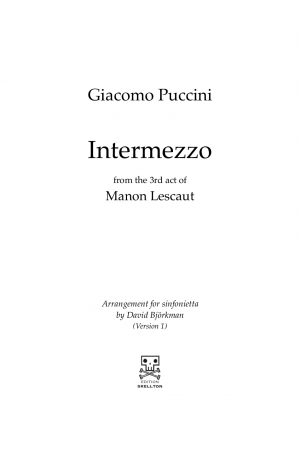British composer Ethel Smyth’s opera The Wreckers premiered in Leipzig at the Neues Theatre on 11 November 1906. This is the best known of Smyth’s six operas, with a libretto by Henry Brewster and Smyth herself.
The three-act work depicts a small harbour community where the locals dutifully attend church, but where the men also plunder ships coming in from the sea. The stage is set for conflict when it is discovered that someone has started warning the ships, and a drama of passion also plays out between two possible whistleblow- ers, both of whom are in love with one of their wives. The action reaches a tragic conclusion. The opera ends with the unfaithful young lovers chained to each other and trapped in a barren cave as the tide rises, until they finally face a watery death in each other’s arms. The Overture is packed with musical imagery. The sound of British sea shanties meets impressionistic series of whole tones. Wagnerian chromatic scales depict the seafoam splashing high into the air, while sacred, heroic chorales are replaced with dancing three-beat melodies that evolve into something more dangerous, before ending up with such grandiose final chords that one would think the whole opera was over. However, this is only the beginning. The prelude to Act 2, On the Cliffs of Cornwall, introduces a different side of Smyth. A transparent, almost exotic tone creates associations with French impressionistic instrumentation, only to shift towards
Russian influences. Here, Smyth demonstrates her broad tonal frame of reference, flirting unabashedly with the stylistic features of Rimsky-Korsakov’s sea music in his masterpiece Scheherazade. Cymbals, triangles, oboes and the cor anglais come together in what might be described as a Turkish style, harking back to the Otto- man Empire where the sultan’s own military orchestra – the janissary band – used these instruments as supporting elements.Smyth’s compositions were recognised with a damehood, but she was also known for her commitment to women’s suffrage. The suffragettes’ own anthem – The March of the Women – was composed by Smyth, and the melody also appears in the overture to her feminist opera The Boatswain’s Mate. But above all, Smyth comes across as a powerful musical personality who decided exactly how she wanted things to be. The events surrounding the premiere of The Wreckers are a good example of her steadfastness, her unwavering self-confidence and her unscrupulous disregard for contemporary norms and rules. Since the opera was due to be staged in Leipzig, Smyth was unable to attend the rehearsals. She arrived the day before the premiere, and was astonished to learn that large parts of the opera had been cut.
“Unacceptable!” thundered Smyth. “It is the only solution,” replied the conductor, since they had not rehearsed the omitted sections. The maestro was clear:
The piece would be performed with cuts, or not at all. And thus it was to be. The Leipzig audience was thrilled, but Smyth herself was unimpressed. This was not how her opera was supposed to be performed! At night, while everyone else slept off the excitement of the premiere, she snuck into the orchestra pit. There, she stole all the orchestral notes and the conductor’s score. When the people of Leipzig woke the next morning, Smyth and The Wreckers had long since boarded a train to Prague. The Leipzig scandal, as it came to be known, meant that there were no more performances of The Wreckers at the Neues Theater that year.
About the 2021 Swedish Wind Ensemble recording project and collaboration between arranger the Swedish Wind Ensemble, Anders Högstedt and Edition Skellton:
“The Swedish Wind Ensemble recorded these works in the same year that Sweden marked the centenary of women’s voting rights. The recording took place at the Musikaliska concert hall in the heart of Stockholm. The Royal Swedish Academy of Music has convened here for a number of musical and historical events over the years, including the presentation of the first Nobel Prize in 1901. The venue also
saw the first Swedish performance of Helena Munktell’s work Breaking Waves, during the Academy’s formal gathering. She, Elfrida Andrée and Clara Schumann were all members of the Academy. Today, Musikaliska is the home of the Swedish Wind Ensemble, and an important arena for acoustic music.
All the works were specially arranged for the Swedish Wind Ensemble by it’s permanent arranger, Anders Högstedt. The pieces were originally written for a symphony orchestra or piano. But is it appropriate to record music adapted for an ensemble, rather than performing it in its original format? The Swedish Wind Ensemble certainly believes so, with its tradition of bringing music closer to the
people. Today, the Swedish Wind Ensemble continues the tradition of bringing live music closer to the people, and in the anniversary year of universal suffrage it felt natural to showcase compositions by both Swedish and international women. Ever since its ‘Skip the Full Beard’ initiative in 2010, the orchestra has developed, arranged and performed a number of works written by women.
With this recording, we want to share some of our work over the years. In this way, we hope that wind ensembles will be able to perform the repertoire we have arranged, thereby giving even more audiences the opportunity to enjoy this music.”
Printed score: 400 sek (B4 format, 28 pages. Coil bound, frosted plastic front, hardback)
Score in PDF: 320 sek (B4 format, 28 pages)
To add parts to your order, please click here:
Printed parts: à 50 kr (B4 format. 3-4 pages, Munken paper)
Parts in PDF: à 40 kr (B4-format. 3-4 pages.)
In the printed material, you get 27 parts: 27 x 50 sek = 1.350 sek
Buying the material in pdf, you get 27 parts : 27 x 40 sek = 1.080 sek
Please contact us to pre-adjust or change the order.

